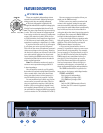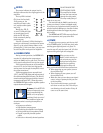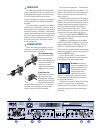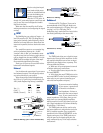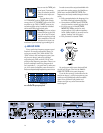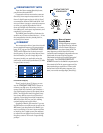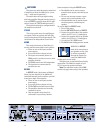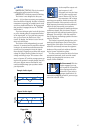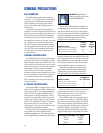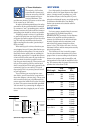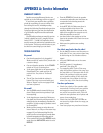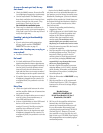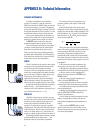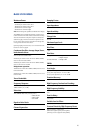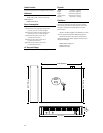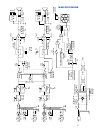
18
GENERAL PRECAUTIONS
WARNING: Bypassing the
plug’s ground pin can be dan-
gerous. NEVER do it!
The AC current demand of an amplifier var-
ies depending on several factors, including the
crest factor and the duty cycle of the program
material. Under typical conditions reproducing
rock music where musical peaks are just below
clipping, the M•800 requires the following
average currents (@120VAC, 60 Hz):
RACK MOUNTING
The M•800 amp requires two rack space
units (2U = 3.5"). It also requires 16.25" depth
inside the rack, including the rear supports.
When designing your rack, put the heavier
items at the bottom and the lighter items to-
ward the top.
Secure the front panel of the amplifier to
the front of the rack using four screws with soft
washers to prevent scratching the panel. In ad-
dition, because of the weight of the amplifier,
you must secure the rear support brackets of
the amplifier to the back of the rack. You could
use a support rail or shelf across the back of
the rack, or angle brackets attached between
the rear support brackets and the rear rails of
the rack. This is recommended for all compo-
nents mounted in a rack that is going to be
moved frequently .
THERMAL CONSIDERATIONS
The M•800 amp is fan-cooled and brings air
in through the front and out through the sides.
Make sure that cool air is available at the front
of the amplifier, and that there is room on each
side for the warm air to exit from the amplifier
and dissipate. If rack-mounted, make sure
there is room for the warm air to circulate
around the side and out through the rear of the
rack. In a typical rack, there will be a space of
1 to 2 inches on either side of the amplifier.
This is adequate to allow the warm air to exit
from the amplifier.
AC POWER CONSIDERATIONS
Be sure the M•800 is plugged into an outlet
that is able to supply the correct voltage speci-
fied for your model. If the voltage should drop
below 97% of line voltage, the M•800 will no
longer be able to supply rated power. (It will
continue to operate down to 65% of the rated
voltage, but it won’t be able to reach full rated
power). The amplifier will mute if the voltage
drops below 65% of the rated voltage. This
could happen if you use a long extension cord,
reproducing music with large peaks.
Be sure the AC outlet can supply enough cur-
rent to allow full power operation of all the
amplifiers plugged into it. The outlet should be a
three-prong socket that matches the power cord.
It is recommended that a stiff supply of AC
power be used because the amplifier places high
current demands on the AC line. The more power
that is available on the line, the louder the ampli-
fier will play and the more peak output power
will be available for cleaner, punchier bass.
Under typical conditions, reproducing rock
music where musical peaks are just below the
clipping point, you can safely connect more
than one amplifier to a 15A service as shown:
Maximum Number
of Amplifiers
Amplifier Loading on a 15A Service
2 ohms per side or 4 ohms bridged 2
4 ohms per side or 8 ohms bridged 3
8 ohms per side or 16 ohms bridged 4
Average Peak
Current Current
Amplifier Loading Required Required
2 ohms per side or 4 ohms bridged 7 A 16 A
4 ohms per side or 8 ohms bridged 4.5 A 11 A
8 ohms per side or 16 ohms bridged 3 A 6.5 A
Due to in-rush current, however, you should
avoid turning them all on at the same time.
Rather, sequence them on, one at a time, to
prevent popping the circuit breaker.
The extension cord used to supply power to
the “amp rack” should have a third wire safety
ground to avoid presenting a safety hazard. We
also recommend using a cord that has conduc-
tors large enough to avoid severely limiting the
amplifier’s ability to supply high currents on
transients. With this in mind, we recommend
using the following for a fully loaded 15A service:
Extension Cord Length Wire Gauge
25 feet 14 AWG
50 feet 12 AWG
100 feet 10 AWG



